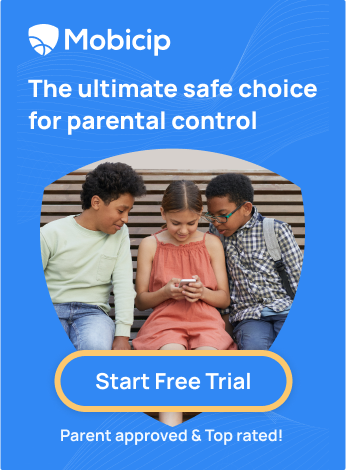The Risks of Not Using Parental Controls on Your Child’s iPhone in 2024
The iPhone is a popular smartphone among children, especially teenagers. According to a survey conducted by Common Sense Media in 2019, 53% of teenagers (ages 13-17) reported owning an iPhone, making it the second most popular smartphone brand among this age group, after Samsung. The same survey also found that 89% of teenagers reported owning a smartphone, and 70% said they use social media multiple times a day. Given these statistics, it's clear that smartphones, including the iPhone, are a prevalent and important part of many children's lives.

Are iPhones beneficial to children?
iPhones and other smartphones can provide children with many benefits. Kids use iPhones in many ways depending on their interests, needs, and age group. Here are some of the most popular ways that children use iPhones:
- Communication: Children use iPhones to stay in touch with friends and family through texting, phone calls, and video chats.
- Social media: Many children use iPhones to access social media apps like TikTok, Instagram, and Snapchat, where they can share photos and videos, communicate with friends, and stay up-to-date with the latest trends.
- Entertainment: Children use iPhones for entertainment, such as playing games, watching videos on YouTube, and listening to music.
- Learning: iPhones are used for educational purposes, such as accessing online resources, educational apps, and e-books.
- Productivity: Older children may use iPhones for productivity, such as managing their schedules, setting reminders, and completing schoolwork.
- Shopping: Children can use iPhones for shopping, such as browsing online stores, making purchases, and managing their finances through banking and budgeting apps.
As Voltaire, and more recently Spiderman, said, "With great power comes great responsibility." This is particularly true when giving a child access to an iPhone. While this technology can be a powerful asset to the child, it also carries serious risks. Therefore, it is the parent or caregiver's responsibility to ensure that the child's safety is protected when using the device. An important step that parents can take to safeguard their children is to set up parental controls on their iPhones.
What is a parental control app?
Parental control apps like Mobicip help parents monitor and manage their child's internet activity. They allow parents to limit their child's internet access, monitor their online activity, and block inappropriate content. Other important features include website blocking, app blocking, content filtering, time management controls, social media monitoring, and location tracking. They are available for various devices, including computers, tablets, and smartphones. Parental control apps aim to provide parents with the tools they need to help keep their children safe and protected online.
The world is becoming increasingly digital, and technology is integral to our daily lives. As such, parents need to be mindful of the potential risks associated with their child's use of iPhones, especially when parental controls are not implemented.
In 2024, not using parental controls on your child's iPhone can pose several risks, including:
- Inappropriate content: Without parental controls, children can easily access inappropriate content, such as violence, pornography, and other explicit material. This can have a negative impact on their mental and emotional well-being, as well as their behavior and attitudes.
- Cyberbullying: Cyberbullying is a significant issue in the digital age, and using social media and messaging apps on an iPhone can exacerbate the problem. Without parental controls, children can be exposed to harmful or threatening messages from their peers, leading to anxiety, depression, and other mental health issues.
- Online predators: The internet is also a breeding ground for predators targeting vulnerable children. These predators can use social media and messaging apps to contact children and engage in inappropriate behavior. Without parental controls, children can unwittingly put themselves in danger by communicating with these individuals.
- Overspending: iPhones come with various apps and in-app purchases, which can lead to overspending if not monitored. Without parental controls, children can make purchases without their parent's knowledge, which can lead to significant financial consequences.
- Screen addiction: With unlimited access to an iPhone, children can quickly become addicted to their screens. This can have negative consequences for their physical and mental health and social and emotional development interfereing with important activities, such as schoolwork, physical exercise, and face-to-face social interaction.
- Identity theft: Children may not fully understand the risks associated with sharing personal information online. Without parental controls, they may inadvertently share sensitive information, such as their home address or social security number, leading to identity theft.
- Malware and viruses: iPhones are not immune to malware and viruses, and children may inadvertently download harmful software. Children can accidentally expose their devices to viruses and other security threats without parental control.
- Inappropriate communication: Without parental controls, children may engage in inappropriate communication with others, such as sharing inappropriate photos or engaging in sexually explicit conversations. This can lead to significant legal and social consequences.
- Distraction while driving: Using an iPhone is a significant safety risk, particularly for young and inexperienced drivers. Without parental controls, children may be tempted to use their phones while driving, leading to accidents and other safety risks.
As we learnt there can be many risks associated with not using parental controls on our child's iPhones. With the increasing amount of harmful online content and cyberbullying, we as parents must be even more vigilant about protecting our children's digital lives.
Thankfully, using parental control software like Mobicip is a simple step that we can take to keep our children safe online. With parental control software, one of the most important things we can do is to set appropriate restrictions and monitor our child's online activities. By doing so, we can ensure that our kids only access appropriate content for their age and maturity level.
It's also crucial to have open and honest conversations with our children about online safety. This means talking to our children about the dangers of sharing personal information online and the importance of being kind and respectful to others. We also need to teach them how to recognize and report cyberbullying if they ever encounter it.
But here's the thing – it's not just about what we tell our kids. We also need to model good device hygiene ourselves. Our children learn by example, so if we exhibit poor device habits, they're likely to follow us. That's why parents and families need to practice responsible device usage. By doing so, we can instill good habits in our children and promote healthy relationships with technology.
The risks of not using parental controls are simply too great to ignore. As parents, it's up to us to take proactive steps to safeguard our children's online experiences. So let's take action, set those parental controls, and keep our kids safe and happy in the digital world!
Keep in touch with the latest on parenting and technology. Subscribe to the Mobicip newsletter. Learn more at www.mobicip.com.






